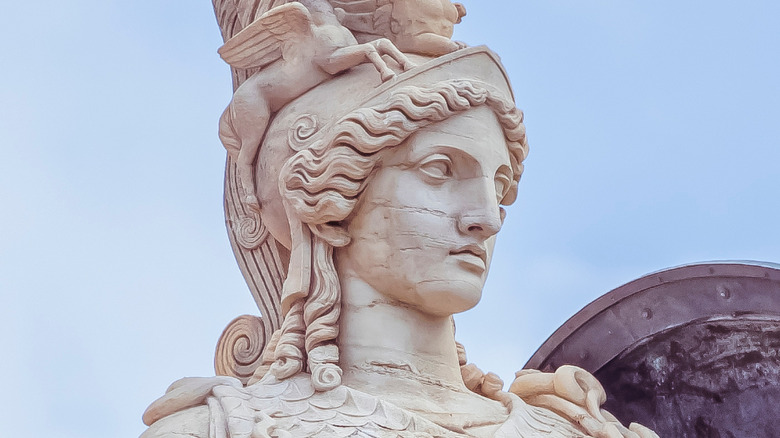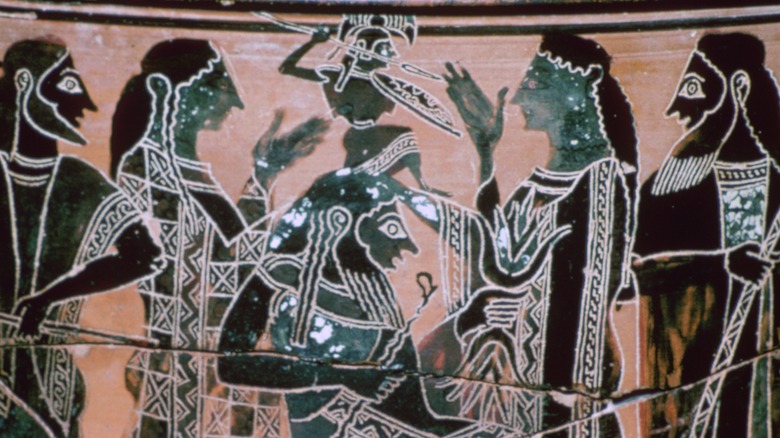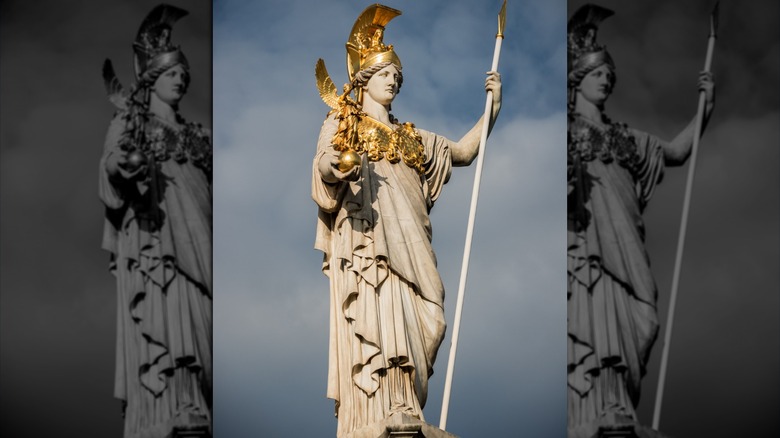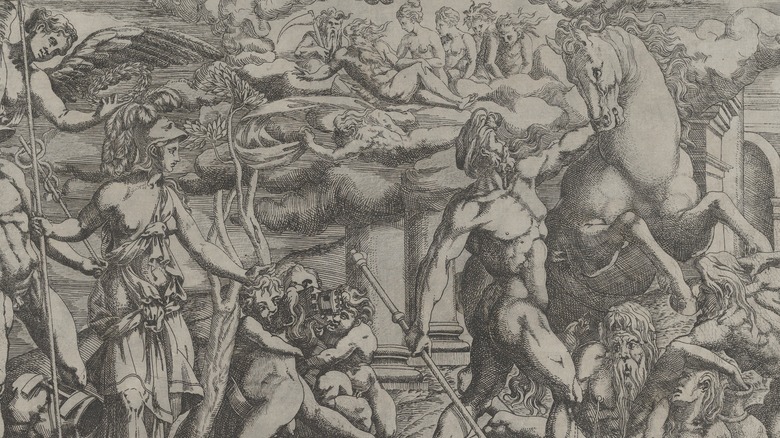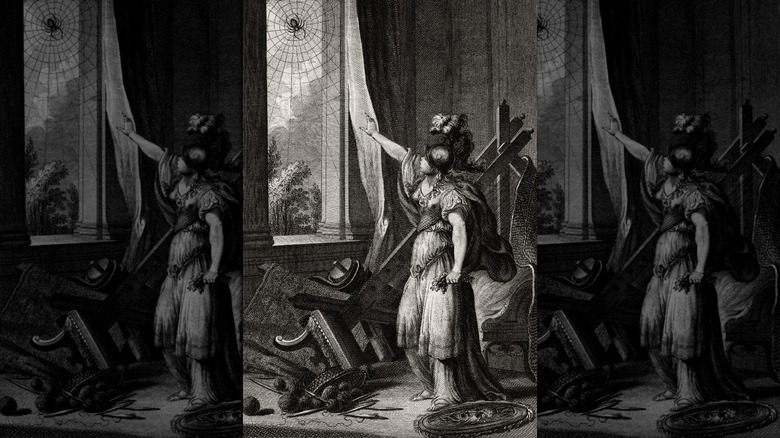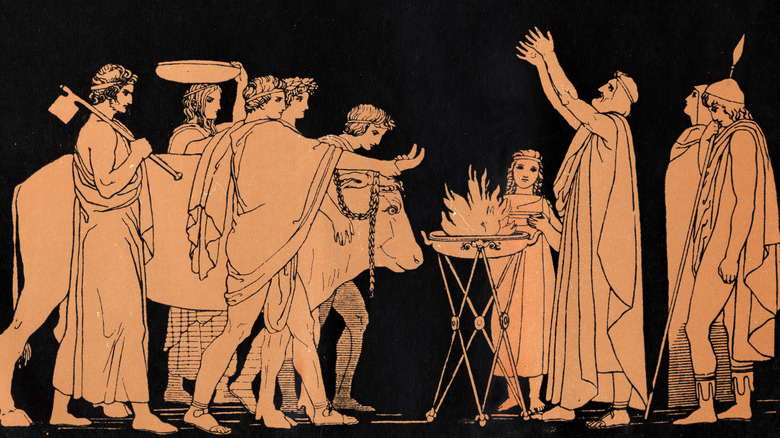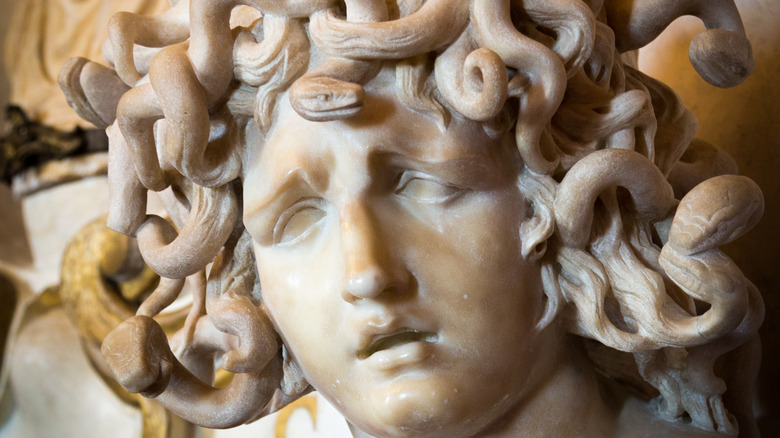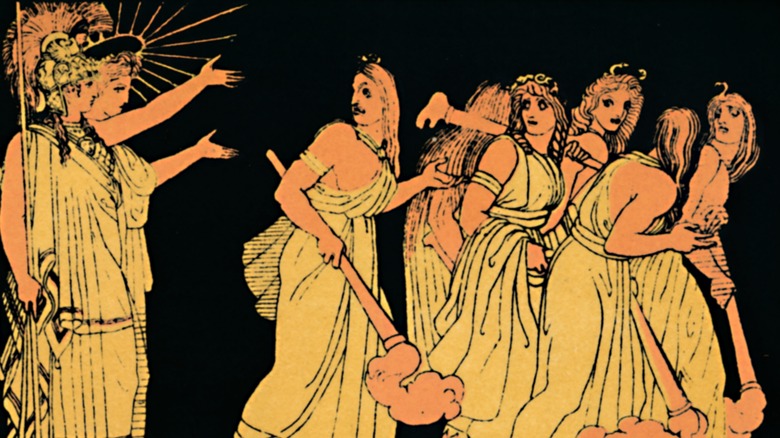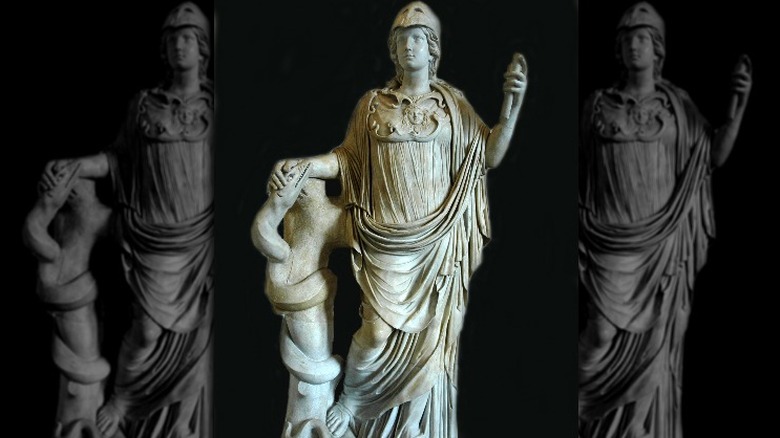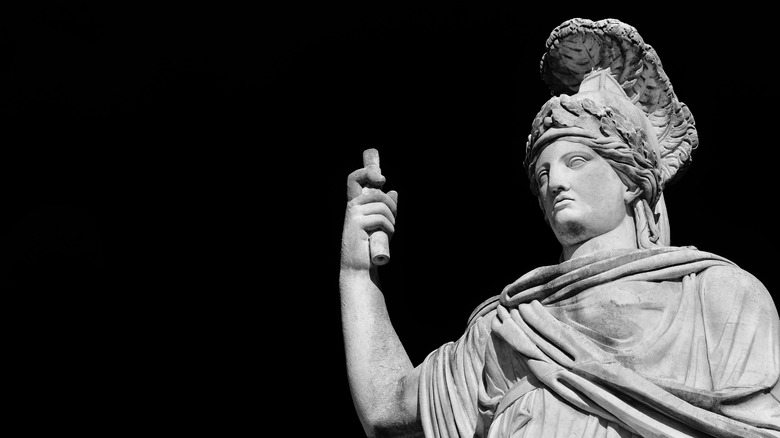The Mythology Of Athena Explained
As the goddess of both wisdom and war, Athena was one of the most important deities in ancient Greek mythology. She was the patron goddess of Athens, defended many beloved heroes, and even fought alongside the Greeks in the Trojan War. Despite her immense power, she was depicted as highly competitive with both mortals and other gods.
While Athena was a mythological figure, the Cult of Athena was very real. The women of ancient Athens had very little influence over their own lives, let alone their community, but the Cult of Athena provided the opportunity to have meaningful power in the city-state.
According to World History Encyclopedia, a few young girls from the nobility were selected to participate in rituals and sacrifices. This provided a rare "opportunity for women to express themselves, be recognized, and contribute to the cultural life of the city." They would act as priestesses, serving Athena generally until they were married, because they were supposed to be virgins like their patron goddess. The high priestess, however, served for life and was one of the most powerful people in Athens, because it was believed that she communicated with Athena herself.
The bizarre birth of a goddess
Zeus conquered his own father, Cronos the Titan, to become king of the Gods. However, Gaea the Earth and Uranus the Sky told him that he would have a son who would overthrow him, too. Some forms of the legend of Athena's birth state that she had no mother. According to Hesiod, as noted by researcher Norman O. Brown, Zeus had a lover named Metis who was going to give birth to a daughter who would be "the equal of her father in power and wisdom," and the son who would overthrow Zeus.
In an effort to save his throne, Zeus swallowed Metis whole. She apparently lived on in his stomach, giving him advice. As recorded in B.A. Hoena's "Athena," Zeus then began to have excruciating headaches. He went to his son, Hephaestus, the god of blacksmiths, for help. Hephaestus split open his immortal father's skull with an ax. The goddess Athena, birthed from Metis and already an armed and ready adult, burst out of her father's head.
What does Athena look like?
Athena was born from her father's head fully clothed, but how the Ancient Greeks imagined those clothes shifted over time. What often remains the same, however, is that, as the goddess of war, Athena is typically depicted ready for battle, wielding a spear and shield and clad in armor, according to Britannica. She is also famously a gray-eyed goddess (though this may depend on the translation of "The Odyssey").
Many love ancient Greek mythology because the gods and goddesses behave like humans in many ways. According to Lloyd Llewellyn-Jones' "Sexy Athena: The Dress and Erotic Presentation of a Virgin War-Goddess," the clothing that Athena was depicted in also mirrored what a woman of the era would wear. The way her clothing looked followed contemporary fashions. Many early depictions of Athena were masculine, with stiff, "protective" clothing shielding her entire body. While slightly later depictions of Athena were more likely to "exhibit her youthful form," she is always fully dressed, unlike the many ancient Greek nude male statues.
Athena won Athens in a contest
Athena wanted to be the patron deity of Attica, Greece. Unfortunately, so did her uncle Poseidon, the powerful god of the sea. According to Shahrukh Husain's "Greece," Athena came up with a contest to decide which of them would protect the kingdom. The two deities would use their power to create something for the city. The king of Attica would be the judge and decide which of them would be a better patron for the kingdom.
Poseidon struck a stone with his trident, and "a jet of bubbling water gushed out." The water became a still pool. Next, Athena approached the rock that Poseidon had split. She planted a single seed in the crack. It immediately grew into a massive olive tree — the very first.
The king considered both acts and determined that although Poseidon showed how powerful he truly was by conjuring water up out of a rock, Athena's gift was one that would actually help the kingdom. Athena became the patron goddess, and the famous city was renamed "Athens" after her.
Athena's temple: the Parthenon
The Athenians, led by the Greek general Pericles, created a temple for Athena, their patron goddess.
According to History, the Parthenon was built during the fifth century B.C. The famed architects Callicrates and Ictinus created the plans for the temple, designing a building with columns of varying sizes and widths that make the construction appear perfectly symmetrical, regardless of perspective. The design has "no straight lines and no right angles." It is visible from all around, because it was on top of "a compound of temples" called the Acropolis. The Parthenon is believed to have cost the modern-day equivalent of $7 million to build.
At the center was a massive statue covered in gold and ivory, depicting Athena, known as Athena Parthenos — however no one was allowed inside to worship. Some believe that the Parthenon may have been used as a treasury as well as a temple, but others believe that it was exclusively a home for Athena in Athens.
Athena, goddess of weaving, is a sore loser
Athena never backed down from a competition, and she didn't only compete with other deities. Ovid's "Metamorphoses," as detailed by "Weaving and Writing: Censorship in Arachne," tells the story of one of Athena's most famous competitions — with a mortal girl.
Arachne was a young human woman who was an exceptional weaver. Everyone said she was so talented she must have been taught by Athena herself — but Arachne insisted that she was self-taught. Not only that, but she claimed that she was more skilled than the goddess. Athena disguised herself as an old mortal woman, and suggested to Arachne that she apologize to the goddess to avoid invoking her wrath. Arachne refused, maintaining that she was the best weaver.
Enraged, Athena revealed her true form and challenged Arachne to a competition. Arachne accepted. Athena weaved an incredible tapestry depicting her victory over Poseidon in the contest for Athens (and even threw in some examples of "the fates of several blasphemous mortals"). Arachne was not intimidated. Her tapestry mocked the gods, depicting many of their "immoral actions." Arachne's confidence was well-placed — her tapestry was better than Athena's.
Athena flew into a rage and transformed Arachne into a spider. Despite her new form, Arachne continued to weave beautiful webs (which may have been superior to the goddess of weaving's tapestries).
Athena and the Golden Apple of Discord
When Peleus, an ancient Greek king, married the sea nymph Thetis, Zeus threw a grand banquet party to celebrate. In order to make sure it would be a good time for the newlyweds and the gods, Zeus decided not to invite Eris, the goddess of discord. As told by Fabrizio Butera and Juan Manuel Falomir-Pichastor, Eris "crashed the party" anyway. She brought a golden apple with her and started a contest that would tear the ancient world apart.
Eris threw the golden apple into the middle of the banquet so that everyone would see the inscription: "for the fairest one." Immediately an argument broke out among the goddesses, as they tried to determine which of them was the most beautiful, and therefore the rightful owner of the apple. Hera, the queen of the gods, Aphrodite, the goddess of love and beauty, and Athena decided on a contest to decide which of them would be the winner.
Like when Athena and Poseidon had their contest a mortal would be the judge: Paris, a young man from Troy. According to Shahrukh Husain's Greece, each of the three goddesses tried to bribe him. Athena offered to make Paris the "wisest man on Earth." Hera offered to make him the ruler of Asia. Aphrodite promised to make Helen of Troy, renowned as the most beautiful woman on Earth, fall in love with him. Paris declared Aphrodite the winner. Unfortunately, Helen already had a husband.
Athena, Goddess of War, in The Iliad
According to History, The Trojan War "straddles the history and mythology of ancient Greece." While there is archeological evidence of Troy, most of the information that we have on the Trojan War comes from Homer's "Iliad," which describes the active participation of the gods in the conflict — including Athena.
After Aphrodite made Helen fall in love with Troy and they ran away together, her husband Menelaus joined together with other Greek kings and heroes to bring her back. As the patron deity of Athens, Athena sided with the Greeks — and as the goddess of war, she was a tremendous ally. Ares, the god of war, was on Troy's side, and their differences are a central part of "The Iliad." As noted in Britannica, "Athena's moral and military superiority to Ares derives in part from the fact that she represents the intellectual and civilized side of war, and the virtues of justice and skill, whereas Ares represents mere blood lust."
Athena fought alongside the Greek heroes, including Odysseus (who was renowned for his intelligence and thus a natural favorite of Athena's). His plan for the "Trojan Horse," a massive wooden horse that the Greeks stated was an offering to Athena that would protect Troy, allowed their soldiers to sneak into Troy and win the war.
Athena is the guide of heroes
In Homer's "Odyssey," Odysseus struggles to return home after the Trojan War. He is cursed by Poseidon's son, and must face sorceresses, monsters, and even the land of the dead. Fortunately, he still has a powerful ally on his side — Athena.
In Book 13 of "The Odyssey," Athena essentially tells Odysseus that she'll always have his back during his travels. As stated by Peter Xiao's article, "The Role of Athena in the Odyssey," Athena intervenes frequently on Odysseus' behalf during his journey. She disguises him, seeks out other humans who will shelter him, and even ensures that his son is ready to fight to restore Odysseus' throne on his return.
While Odysseus was clearly a favorite of Athena's, he is not the only hero that she assists. As noted by Tufts University, this included the famed hero Hercules. When he was forced to perform his "labors," or heroic tasks, Athena often stepped in to help. For instance, when he was charged with driving away a massive flock of man-eating birds, Athena gave him, "a pair of bronze krotala, noisemaking clappers similar to castanets," which scared the monsters into the air so Hercules could hit them with his slingshot.
Another of those heroes was Perseus, who was trying to kill the gorgon Medusa. Athena helped him, but her relationship with Medusa was more complex than a patron god helping a hero succeed on a quest.
Athena created Medusa
Medusa, with snakes for hair, turning men to stone with a glance, is one of the most famous figures in Greek mythology. According to The Met, however, she wasn't always a monster. According to some versions of the legend (including the one told by the Roman writer Ovid) Medusa was once a human girl.
The human Medusa was supposed to be very beautiful. The sea god Poseidon seduced her — in Athena's temple. This was so offensive to the goddess that she transformed Medusa into a monster, turning her hair into snakes.
In order to rescue a woman that he was captivated by from her wicked father, Perseus had to bring him Medusa's head. Every other hero had failed to kill her, because when they looked at her, they turned to stone. Always wily, Athena gave Perseus her shield, which was so polished that it was like a mirror. This allowed him to approach Medusa by looking at her reflection in the shield rather than directly at her — which protected him from turning to stone. He beheaded the Gorgon and used Medusa's head to rescue his love and turn her father to stone.
Athena doesn't care about mothers
Not every deity was as giving with their favor as Athena. When King Agamemnon left for the Trojan War, he had to make a sacrifice to Artemis, goddess of the hunt, to ensure that he and his fleet of ships would arrive safely in Troy. As stated by Britannica, the sacrifice Artemis demanded was Agamemnon's oldest daughter.
Agamemnon killing his own daughter worked, and he survived both the journey to Troy and the war. On his return, however, he was murdered by his wife and her lover (which some versions imply was because she wanted to stay with her lover, while others imply was revenge for her daughter's murder). Agamemnon's son Orestes later returned to murder his mother in vengeance for his father's murder. He is then hunted by the Furies, described by the editors of Britannica as "chthonic goddesses of vengeance," for the crime of matricide. Orestes argued that no matter what he did, he would be acting immorally, because he had to choose between letting his father's murderer get away and killing his own mother. To determine whether he was guilty or not, the Furies turned to Athena, since she was the goddess of reason and justice.
In the end, Athena judged that Orestes should go free. Why? According to Aeschylus, it's because "she had no mother, having sprung from the head of Zeus," so mothers are less important. This means that avenging one's father is more important than not killing their mother.
The Virgin Goddess had a 'son'
In a way, Athena was a mother herself.
According to Oxford Classical Dictionary, Athena visited Hephaestus, the god of smiths, to ask him to forge some new weapons for her. While they were alone together, Hephaestus tried to seduce Athena, but he failed. Then he tried to force himself on her, but the goddess of war fought him off. Hephaestus, "succeeded only in spilling his seed" on Athena's leg, which she wiped off.
When the "seed" fell on the ground, however, it went to Gaea, the Earth. Gaea had a son, who she named Erichthonius. She gave the child to Athena. The goddess took the baby and locked it in a box, forbidding anyone to open it. When two mortal women did open the box, what they saw horrified them. Some versions of the myth state that the child was wrapped in snakes, while others specify that the child was half-snake himself. Whether by the snakes, the monster, or Athena for breaking her commandment, the women were killed.
While her parenting methods may seem unusual, there are signs that Athena and her adopted son had a good relationship. In many depictions of Athena, she is accompanied by a snake. The historian Herodotus claimed that the massive snake actually lived in Athena's temple, guarding the acropolis.
Athena punished a man for spying on her
Athena fought off Hephaestus, but he wasn't the only man that the goddess of war took revenge on for overstepping. The Alfred Tennyson poem "Tiresias" tells the story of a young mortal man who happened upon Athena in the woods.
Tiresias was walking through the forest alone, and he came to a secret spot where Athena had decided to bathe in a pool of water and was just getting out. Whether it was an innocent mistake or intentional voyeurism, he saw Athena getting out of the bath, before she put her armor back on. Immediately, Tiresias heard a voice saying, "Henceforth be blind, for thou hast seen too much, And speak the truth that no man may believe." From then on, he was blind, so he would never be able to spy on Athena again — or see anything else for the rest of his life.
